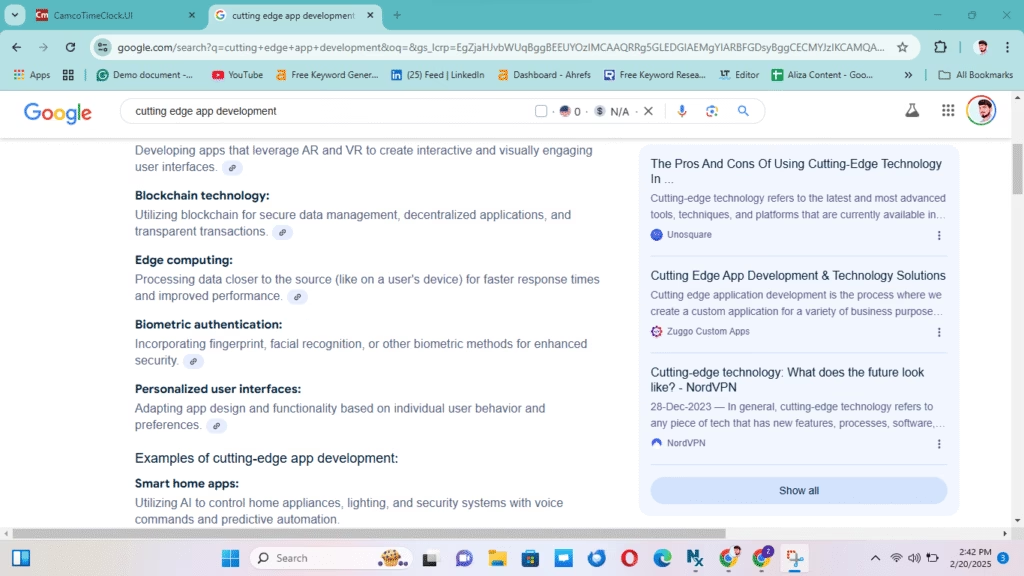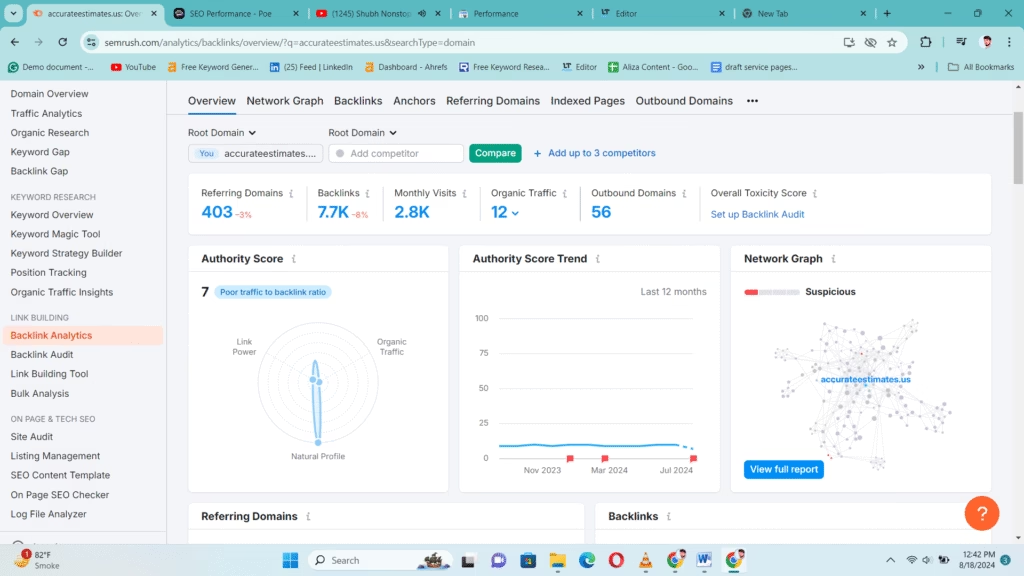AI has made SEO more strategic competitive, and businesses are more focused on using different platforms. AI basically updated SEO by altering how search engines recognize user inquiries and how businesses optimize content. Through the specialized keyword techniques of 2002 to today’s AI-based strategies, SEO has transformed to focus on user behaviour and motives.

Historical Analysis of SEO
In 2002 SEO was based on simple strategies like keyword optimization and link operations, with Google answering about 2 billion searches each year. Search inquiries were basic, averaging 2–3 words, and engines displayed professionalism. Through implementing AI strategies, this focus on technical innovations more than content reliability.
Modern SEO Landscape
In 2025 Google executes almost 16.4 billion searches per day, counting approximately 6 trillion every year, with a 90.14% global market share.
Important developments involve,
LLM Growth: Search preferences in large language models (LLMs) surged 4,850% over five years, raising answer engines like ChatGPT.
AI Overviews: 30% of U.S. SERPs (5 states) boast AI Overviews, up from 25% in August 2024.
Zero-Click Searches: Over 70% of query results end without clicks, displaced by AI Overviews and highlight snippets.
Voice Search: 27% of global social media users use voice search on mobile devices, assisted by AI assistants like Siri and Alexa.

Future Developments
By 2026 the researcher is expecting a 25% decline in average search revenue, with AI chatbots acquiring market positions. The future of SEO will be focused on answer engines, voice and interactive search, and AI-based customization, calculating improvements with profitable objectives.
SEO Strategies Pre-AI Dominance
SEO was in its starter stages, limited by simple techniques that involved early search engine strategies. These creative tactics are related to keyword improvement, where content was optimized with standard keywords to boost search engine rankings, frequently at the expense of efficiency.
Link providers, corresponding to invalid, spammy backlinks, were deployed to improve PageRank, Google’s basic ranking method. Search engine advancement was centred on meta tags, title tags, and standard HTML designs, with relatively little focus on the customer interface.

Modern SEO Statistics and Trends
The field of SEO has improved greatly, operated by AI and robotic technological innovations. In 2025, the upcoming metrics focus on the instant state:
International Search Statistics: Google, the leading operator with a 90.14% market share, deals with around 16.4 billion searches per day, amounting to an approximate 6 trillion searches per year. This estimate is calculated on recent data from SEMrush, pointing to the intensity of user conflict. Bing operates with a 7.3% share in the U.S., while AI-based offerings like ChatGPT and Perplexity are developing success, though their revenue figures are still lower.
AI Overviews Impact: AI Overviews, placed to deliver personalized answers on SERPs, have seen broad recognition. Boast AI Overviews, up from 25% in August 2024, according to new data published by Seranking. This development, especially recognized after the March 2025 basic upgrade, impacts domains like entertainment, restaurants, and travel, decreasing lead conversion rates for standard organic searches.
Zero-Click Searches: The trend of zero-click searches, where users get guidance proactively on the SERP, is significant. Recently released indicators show that over 70% of queries end without any clicks, operated by AI Overviews, boasted snippets, and statistical pages. This increase, communicated to exceed 70% by 2025 depending on January research, points to a change toward SERP-first answers, altering organic traffic significantly.
Voice Search Development: Voice search implementation is going to improve, with 27% of the overall online market utilizing voice search on mobile phones. This data figure, obtained from Think with Google and altered in modern investigations, details the role of AI-powered robotics like Siri and Alexa in maximizing revenues for search inquiries.
LLM Development: Search activity in large language models (LLMs) has seen a notable spike, described as 4,850% over the previous five years, indicating the growing popularity of answer engines like ChatGPT and Perplexity. The upward spiral holds on, with estimates indicating enhanced engagement in apps (750 million by 2025) and market growth from $6.4 billion in 2024 to $36.1 billion by 2030. This growing trend highlights LLMs’ effectiveness in altering search attitudes.

Modern SEO Strategies: Best Practices for 2025
Current SEO is a collection of traditional tactics and AI-driven updates, aligned with Google’s E-E-A-T guidelines. The recommended guidelines, supported by data, are profitable as of May 2025:
Content Management for AI Overviews and Answer Engines
AI Overviews focus on detailed, standard content. This delivers detailed guidelines to figure out “why” and “how” inquiries, as 58% of SEO specialists intend to incorporate automatically generated AI for content marketing. Implement logical statistics like FAQ page frameworks to increase reach, with research indicating up to 30% increased click-through rates.
Voice Search Optimization
According to 27% global deployment, optimize for linguistic demands through descriptive keywords (e.g., “What are the greatest walking spots around me?”). Take advantage of NLP tools, with 35% of corporations integrating AI for SEO algorithms, and concentrate on local SEO, where 52% of experts provide updates to AI-driven tools.
Technical SEO Optimizations
Monitor your website loading speeds and Core Web Vitals, with 75% of advertisers applying AI to execute projects like keyword improvements. Target mobile optimization for Google’s mobile-first indexing strategy and deploy AI spiders for website crawl revenue growth, repair broken links to improve page rank.
AI-Driven Keyword Optimization and Content Creation
Utilize AI for traffic data visualization, with 84% of operators understanding changes, and content creation, where 67% communicate efficiency optimizations. This feedback assessment integrates content with user objectives, raising awareness and extending its duration.
Generative Engine Optimization (GEO)
Focus on high-value referral links for AI algorithms, optimize for conversational interest over very similar keywords, and develop broad outreach, especially on YouTube, the second-leading search engine.

The Future of SEO: Trends and Projections
Directly outward, the SEO market will proceed to develop, with crucial benefits for techniques:
Rise of Answer Engines
By 2026, Gartner estimated a 25% decline in traditional search traffic, with AI chatbots and digital experts acquiring market share. This involves optimizing for zero-click searches and entity-focused SEO.
Voice and Visual Search
Voice search will improve, with AI assistants managing detailed inquiries, while visual search tools like Google Lens develop growth. Optimizing for high-quality visuals with schema markup and quickly loading content to enable 5G and border data collection.
AI-Driven Customization
AI will deliver uniquely tailored search results, communicated to provide $19.9 trillion to global GDP by 2030. Advertising agencies will use AI for personalized content and continuous growth tracking, balancing technological progress with user data security.
Integrity and Privacy Challenges
As AI collects insights, ethical issues related to accessibility and bias will grow more serious. Improve communication and manage AI opinions to boost trust, ensuring reasonable outcomes.
Coordination with Innovative Technologies
Quantity data collection will improve AI content research, involving professional advertising, while AR/VR will broaden SEO to interactive networks, modifying for tangible experiences.
Summary: Balancing AI and Human Expertise
AI has radically changed SEO, altering it from keyword optimization to user preferences and technical reliability. Though 75% of marketers utilize AI for effective execution, human innovation will stay valuable for creative, attractive content.
Along with implementing AI tools for processing and customization, businesses can sustain recognition and develop reliability, going through to E-E-A-T standards. To become successful in 2025 and beyond, focus on professional content, technical SEO, and responses to growing technologies like voice search and AI-driven customization.
How has AI generally altered SEO?
Artificial intelligence has been developed into Google’s search algorithms since 2015, making them more effective at assessing user searching intent and providing more helpful search results depending on user activity. AI-powered programs such as Google’s Rank Brain have actively altered SEO by optimizing search result reliability and personalized content.
How does AI help with content creation and optimization for SEO?
Generative AI has radically changed content creation and optimization for SEO by extending execution time and serving to improve content standards and authority. They can enable businesses to build personalized content using simple language coding, ensuring maximum search interest and replying to user inquiries.
What are specific ways AI-driven tools are utilized in SEO?
AI-driven tools enable SEO processes by gathering records, supplying constructive criticism, and offering to apply tactics positioned at upgrading a website’s search engine ranking. The specific tasks involve measuring user motivation at a higher level associated with prospective keywords, including long-tail and user-based keywords.
Discover more from Yeilp - (Start, Grow, and Scale Your Business)
Subscribe to get the latest posts sent to your email.






